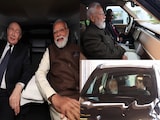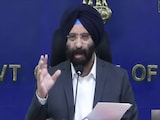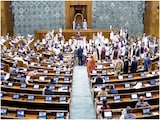Azerbaijan's President Ilham Aliyev said Wednesday his country had regained control over breakaway Nagorno-Karabakh, after separatist Armenian fighters agreed to lay down their arms in the face of a military operation.
The stunning collapse of separatist resistance represents a major victory for Aliyev in his quest to bring Armenian-majority Nagorno-Karabakh back under Baku's control.
Armenia and Azerbaijan have fought two wars over the mountainous region since the collapse of the Soviet Union.
A day after Azerbaijan launched a military operation in the region, Baku and the ethnic Armenian authorities in Karabakh announced a ceasefire deal had been brokered by Russian peacekeepers to stop the fighting.
"Azerbaijan restored its sovereignty as a result of successful anti-terrorist measures in Karabakh," Aliyev said in a televised address.
Aliyev claimed that most of the Armenian forces in the region had been destroyed and said the withdrawal of separatist troops had already begun.
Under the truce deal, the separatists said they had agreed to fully dismantle their army and that Armenia would pull out any forces it had in the region.
Azerbaijan's defence ministry said that "all weapons and heavy armaments are to be surrendered" under the supervision of Russia's 2,000-strong peacekeeping force on the ground.
Both sides said talks on reintegrating the breakaway territory into the rest of Azerbaijan would be held on Thursday in the city of Yevlakh.
Russian peacekeepers said Wednesday evening that the ceasefire was holding and there were no violations recorded.
Baku's operation marked the latest spasm of violence over the rugged territory.
After the Soviet Union fell apart, Armenian separatists seized the region -- internationally recognised as part of Azerbaijan -- in the early 1990s and it is home to some 120,000 ethnic Armenians.
The war left 30,000 people dead and forced hundreds of thousands from their homes.
In a six-week war in 2020, Azerbaijan recaptured swathes of territory in and around the region.
The years of conflict have been marked by ethnic cleansing and abuses on both sides, and there are concerns of a fresh refugee crisis as Karabakh's Armenian population fears being forced out.
Azerbaijani presidential foreign policy advisor Hikmet Hajiyev promised safe passage for the separatists who surrendered and said Baku sought the "peaceful reintegration" of Karabakh Armenians.
Charles Michel, president of the EU's Council of Europe, urged Baku to ensure the safety of the local population.
Russian President Vladimir Putin said he hoped for a "peaceful" resolution, adding that Moscow has been in contact with all sides in the conflict.
Putin held talks with Armenian Prime Minister Nikol Pashinyan Wednesday evening, but the Kremlin insisted the crisis was "Azerbaijan's internal affair".
- 'War is over' -
Jubilant residents in Azerbaijan's capital expressed hope the deal heralded a definitive victory in -- and the end of -- the decades-long conflict.
"I was very happy with this news. Finally, the war is over," 67-year-old pensioner Rana Ahmedova, told AFP.
Armenia said at least 32 people were killed and more than 200 wounded by the shelling in Karabakh, as the latest onslaught from Azerbaijan saw artillery, aircraft and drone strikes rock the region.
Moscow said several of its peacekeepers in Karabakh were killed when the car they were travelling in came under fire.
In Yerevan, Pashinyan said it was "very important" the ceasefire hold.
Again denying his country's army was in the enclave, he said he expected Russia's peacekeepers to ensure Karabakh's ethnic-Armenian residents could stay "in their homes, on their land".
The loss in Karabakh ratchets up domestic pressure on Pashinyan, who has faced stinging criticism at home for making concessions to Azerbaijan since the 2020 defeat.
The Armenian leader insisted that his government had not been involved in drafting the latest ceasefire deal.
Thousands of protesters waving the separatist region's flag blocked a main road in Armenia's capital Yerevan as riot police protected official buildings.
"We are losing our homeland, we are losing our people," said Sargis Hayats, a 20-year-old musician.
Pashinyan "must leave, time has shown that he cannot rule. No one gave him a mandate for Karabakh to capitulate," he said.
- International pressure -
The ceasefire announcement came after Aliyev warned the military operation would continue until the separatists laid down their weapons, despite international pressure to halt fighting.
The outburst of fighting came as Moscow, the traditional power broker in the region, is bogged down and distracted by its war on Ukraine, which has left it isolated by the West.
But its peacekeepers there appeared to have played a key role in helping to negotiate the ceasefire and will now oversee its implementation.
Turkey, a historic ally of predominantly Muslim Azerbaijan that views mostly Christian Armenia as one of its main regional rivals, had called the operation "justified".
The EU and United States have been mediating talks between Baku and Yerevan in recent months aimed at securing a lasting peace deal between the two foes.
(Except for the headline, this story has not been edited by NDTV staff and is published from a syndicated feed.)















